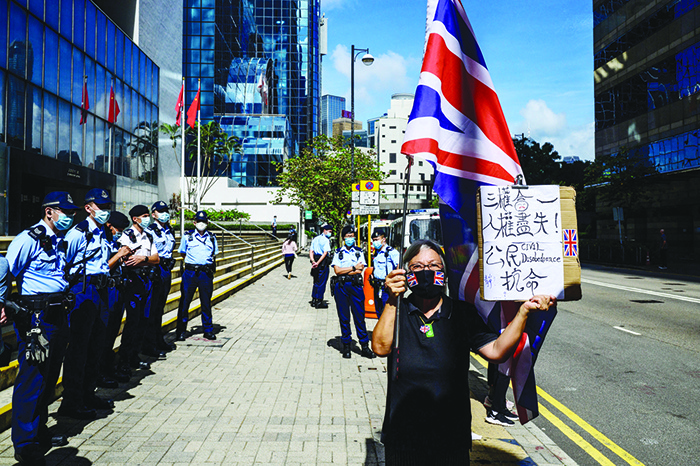 HONG KONG: Alexandra Wong (right), an activist known as Grandma Wong, holds a British Union Jack flag outside the District Court in Hong Kong, as nine pro-democracy activists await their sentencing for charges of unauthorized assembly on China’s National Day on October 1, 2019. — AFP
HONG KONG: Alexandra Wong (right), an activist known as Grandma Wong, holds a British Union Jack flag outside the District Court in Hong Kong, as nine pro-democracy activists await their sentencing for charges of unauthorized assembly on China’s National Day on October 1, 2019. — AFP
HONG KONG: Hong Kong police have arrested an elderly democracy activist as she made a solo demonstration over China’s deadly Tiananmen crackdown in a vivid illustration of the zero protest tolerance now wielded by authorities in the financial hub. Alexandra Wong, 65, was detained on Sunday on suspicion of taking part in an unlawful assembly as she walked towards Beijing’s Liaison Office in Hong Kong. Wong-known locally as “Grandma Wong”-was a regular fixture of the huge democracy protests that swept Hong Kong in 2019.
She could often be seen waving a Union Jack flag, a symbol of her dissatisfaction with Beijing’s rule since the city was handed to China by former colonial power Britain in 1997. Protest is now all but outlawed in Hong Kong. Authorities have used both the threat of the coronavirus and security concerns to ban demonstrations. A vigil planned for this Friday — the 32nd anniversary of Beijing’s 1989 crackdown on democracy protests in Tiananmen Square — has been denied permission for the second year in a row.
Authorities have cited the coronavirus, although Hong Kong is currently celebrating no local transmission cases of unknown origin for the last month. Activists had also sought permission for a small Tiananmen-themed march on Sunday to the Liaison Office, which represents the central government in the city, but it was also denied permission. Wong turned up anyway that afternoon holding as sign that read “32, June 4, Tiananmen’s lament” and a yellow umbrella-the latter a symbol of Hong Kong’s democracy movement.
The South China Morning Post said the pensioner started chanting slogans in a park before heading towards the Liaison Office by herself, while being followed and filmed by police. She was stopped twice. “I’m only by myself, just an old lady here. Why stop me?” the Post quoted Wong as telling officers. Soon afterwards she was arrested. Police confirmed a 65-year-old woman surnamed Wong had been arrested for “knowingly participating in an unauthorized assembly and attempting to incite others to join an unauthorized assembly.”
Hong Kong’s democracy movement has been crushed by a broad crackdown on dissent over the last year, including the imposition of a sweeping security law that criminalizes much dissent. In the middle of the 2019 protests Wong disappeared for more than a year. She resurfaced saying she had been detained by mainland authorities during a trip to Shenzhen, a neighboring city where she lived at the time.
‘Subversive’ activists
Dozens of leading Hong Kong democracy activists could face up to life in prison for organizing an unofficial primary election, prosecutors confirmed yesterday, in the most sweeping use yet of Beijing’s strict new security law. Police charged the 47 activists with “subversion” after they organized a non-binding vote last year to choose candidates for an ultimately postponed local election. The defendants say they were simply taking part in opposition politics. But authorities accused them of a “vicious plot” to subvert the government by seeking a majority in the city’s partially-elected legislature.
Yesterday the defendants appeared en masse for the first time in nearly three months at a hearing in which a judge granted a request by prosecutors to have the case upgraded to the city’s High Court. Offences heard in that court start at seven years imprisonment for those who are convicted. The maximum penalty under the new security law is life in prison. Beijing has moved to quash dissent in the semi-autonomous city after huge and sometimes violent pro-democracy demonstrations in 2019.
The security law criminalizes anything authorities deem to be subversion, secession, terrorism or collusion with foreign forces. Police and prosecutors have since applied the law broadly with the vast majority of those charged for political speech. Under the new law-which Beijing imposed directly on the city last June — defendants may only be granted bail if they can persuade a court they no longer pose any kind of national security risk. That clause has removed Hong Kong’s common law tradition that maintains a presumption of bail for non-violent crimes.
Yesterday’s proceedings were the first time the public was able to see most of the defendants since early March when the vast majority-36 — were denied bail at a mammoth hearing. That hearing dragged on for so many days that some of those in the dock collapsed from exhaustion. Bail decisions published since that hearing have revealed that judges are deciding whether some of those in custody still pose a potential security risk. Claudia Mo, a former lawmaker, was denied bail partly because of WhatsApp messages with foreign journalists in which she commented on news and political events.
Another former lawmaker Jeremy Tam saw his application turned down in part because the United States consulate invited him by email for a “catch up”-even though the email went unanswered. In both instances judges argued the fact that the two defendants remained influential meant denial of bail was needed. China says the national security law is needed to restore stability. Critics say it has eviscerated the freedoms Hong Kong was promised ahead of its handover and has rapidly begun to change city’s vaunted, business reliable common law traditions. —AFP
.jpg)



